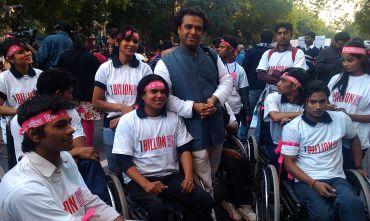 Nearly a thousand people from all walks of life assembled at New Delhi’s Parliament Street on Thursday evening to conclude day-long celebrations of the global women rights movement One Billion Rising’s South Asia chapter.
Nearly a thousand people from all walks of life assembled at New Delhi’s Parliament Street on Thursday evening to conclude day-long celebrations of the global women rights movement One Billion Rising’s South Asia chapter.
While some swayed to drum beats and watched differently-abled children perform on the tunes of ‘Jai Ho’ on their wheelchairs, others wore pink ribbons and spread the message of women’s safety -- everything to underline the unfortunate fact that Delhi authorities haven’t done anything yet to remove its ‘rape capital of India’ label.
Kamla Bhasin, the coordinator of One Billion Rising in South Asia, tells Rediff.com’s Priyanka that their movement has become a tsunami today and also explains why they are against death penalty even for rapists.
Tell us, how did the One Billion Rising campaign happened?
Eve Ensler, who wrote the historical play the Vagina Monologues, gave a call for One Billion Rising. They started the organisation 15 years ago and have been working relentlessly to counter violence against women. But sadly, the violence persists.
Ensler, who is a friend of mine, spoke to me in the June of 2012, and said the campaign must be here in South Asia.
I was, however, very clear that the campaign would be different here, which means that though it would be about violence against women and inequality, the medium had to be different. We may not want to talk about the Vagina Monologues here; not everyone may want to dance. Hence, since June 2012, this campaign has been decentralised and democratic.
From sex workers to disabled women and acid attack victims -- all are taking up their issues.
You have been at the forefront of this campaign here…
Yes, we’ve been working for the rights of women for almost four decades through various platforms like Jagori, South Asians for Human Rights (SAHR) or Sangat. There is a huge network of women help groups. We spoke with our partners in Nepal, Afghanistan and other countries, and the word spread.
This is a culmination of work done in the past 40 years across the region, and symbolises our solidarity.
One Billion Rising is a celebration of women’s movement. We have existed for many years. One Kamla Bhasin or Eve Ensler cannot bring it. There were drops, and today we have become a tsunami. We will rise again on March 8 and on May 1.
What shape will the campaign take in the coming days?
Jagori works throughout the year, but here, today, we see a lot of young people, and we want to reach out to them. The tragic incident of December 16 has brought a lot of young people on the streets.
There are many questions on their minds. Many of them are asking for death penalty for the rapists, but we are against it. We have to initiate dialogue with the youth.
So many men have come forward, and we have to reach out to them as well. The men often say that they will protect us, but we want to tell them that they need to stop violating us first, and then we won’t need any protection.
What is your message to the youth?
We want to tell them that violence against women and inequality is a complex issue. There are patriarchal norms within our religion, its deep-rooted in our culture, it is in our law, in our politicians, poetry, advertisements. It also exists in Hollywood and in our Bollywood. We need to make a network with all these people all over and only then we can fight patriarchy.
How will things change?
Well, we have been working on these issues for many years, and these are concrete steps. We are all fighting for the wages of women working under (UPA government’s flagship programme) Mahatma Gandhi National Rural Employment Guarantee scheme. We don’t have to pan out anywhere, as there are many rural women working in Andhra Pradesh, Tamil Nadu, Odisha and so many other places in our country.
A lot of the people would want death penalty for rapists. How will you convince them?
We will talk to them to take objection to all kinds of violence. One form of violence cannot be fought with another form of violence. And if they say we want it, then, I am sorry, we are not with them. If rape is violence, then giving death to somebody is also violence. I have made many mistakes in my life and I am a different person today. I believe in the goodness of humanity.
Furthermore, today, many are arguing that a rapist should be given death penalty; tomorrow, a Hindu will say that a Muslim should be given death penalty on some pretext; someone else will say women wearing jeans should be given death penalty… Death penalty is barbaric. Dialogue is the only way.
Did you find it unusual that a lot of people across the country came together on the issue of women’s safety?
It was historic. It happened for the first time. But don’t forget that feminism has been in the air. Human rights have been in the air. Last year, the anti-corruption movement was in the air. We have to reach out to the youth, who is on the streets today.
Image: Members of Ability Unlimited, a group of differently-abled children, who performed to a cheering crowd while participating in One Billion Rising celebrations in New Delhi on Thursday.
Photograph: Priyanka/Rediff.com






 © 2025
© 2025